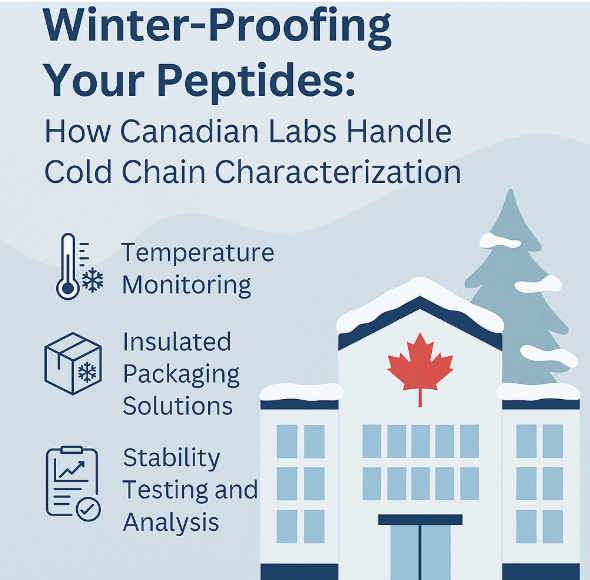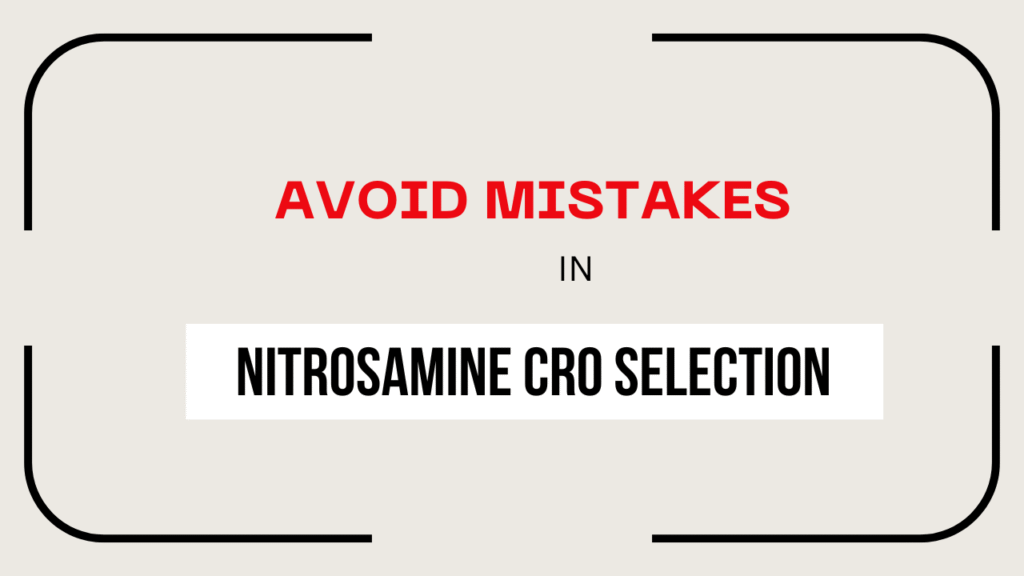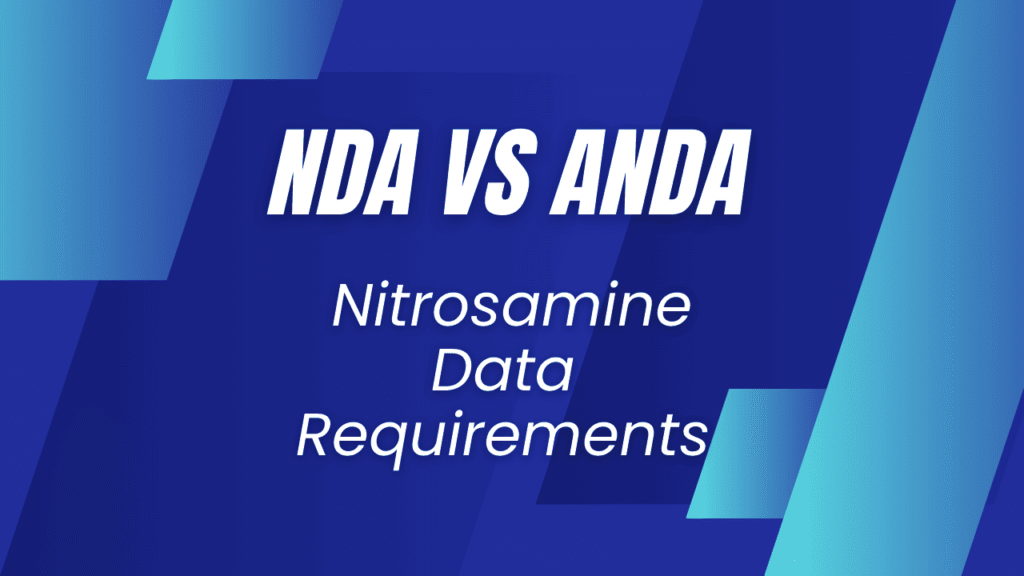
Peptides, as intricate chains of amino acids, are fundamental to numerous pharmaceutical and biotechnological applications. Their structural delicacy, however, makes them particularly susceptible to environmental conditions, especially temperature fluctuations. In Canada, where winters can be exceptionally harsh, maintaining the integrity of peptide-based products is paramount. This article delves into the strategies employed by Canadian laboratories to ensure Peptide Characterization Service in Canada during cold seasons, emphasizing the critical role of cold chain characterization.
Understanding Peptide Characterization Service in Canada
Peptides are prone to degradation through various pathways, including hydrolysis, oxidation, and aggregation. Temperature variations can accelerate these degradation processes, leading to reduced efficacy or even harmful effects. Therefore, understanding and mitigating the impact of cold temperatures on peptides is essential for their effective application.
The Canadian Climate Challenge
Canada’s climate poses unique challenges for peptide storage and transportation. With temperatures often plummeting below freezing during winter months, peptides can be exposed to conditions that may compromise their stability. This necessitates robust cold chain management practices to ensure product integrity from production to end-use.
Peptide Characterization Service in Canada: A Canadian Perspective
Cold chain characterization involves the systematic assessment and validation of storage and transportation conditions to maintain product quality. Canadian laboratories have developed specialized protocols to address the challenges posed by their climate.
Advanced Monitoring Systems
Implementing real-time temperature monitoring systems is crucial. These systems provide continuous data on storage conditions, enabling immediate corrective actions if deviations occur. Such proactive measures are vital in preventing temperature-induced peptide degradation.
Validation of Storage Equipment
Regular validation and maintenance of refrigeration units and freezers ensure they operate within specified parameters. This includes routine calibration and performance qualification to guarantee consistent temperature control.
Specialized Packaging Solutions
Utilizing insulated and temperature-controlled packaging during transportation helps mitigate external temperature impacts. Materials with high thermal resistance and phase change materials (PCMs) are often employed to maintain the desired temperature range.
Case Study: ResolveMass Laboratories Inc.
ResolveMass Laboratories Inc., based in Laval, Quebec, exemplifies excellence in peptide characterization and cold chain management. Their comprehensive approach includes:
- Custom Synthesis and Analysis: Offering tailored peptide synthesis with rigorous analytical assessments to ensure structural integrity.
- State-of-the-Art Facilities: Equipped with advanced instrumentation for mass spectrometry and chromatography, facilitating precise impurity profiling and stability testing.
- Robust Quality Assurance: Implementing stringent quality control measures aligned with regulatory standards to maintain product consistency and reliability.
By integrating these practices, ResolveMass Laboratories ensures that peptides remain stable and effective, even amidst Canada’s challenging winter conditions.
Regulatory Considerations
Adherence to regulatory guidelines is imperative in cold chain management. Health Canada, along with international bodies, provides frameworks for the proper handling and storage of temperature-sensitive products. Compliance with these regulations not only ensures product efficacy but also safeguards public health.
The Science Behind Winter-Proofing Peptides: Challenges and Innovations
Peptides are delicate biomolecules, susceptible to temperature, moisture, oxidation, and mechanical stress. In Canadian climates, where extreme winter conditions can challenge even the most robust supply chains, maintaining peptide integrity during transport, storage, and analysis becomes paramount. Winter-proofing is not just a logistics task—it’s a scientific protocol built into every phase of peptide characterization services in Canada.
1. The Cold Chain and Its Impact on Peptides
A consistent cold chain (2–8°C or frozen at -20°C or -80°C) is essential for maintaining the stability of peptides during handling. Fluctuations outside this range can lead to:
- Hydrolysis of peptide bonds
- Aggregation or precipitation
- Deamidation and oxidation
- Conformational changes
Therefore, Canadian labs like ResolveMass Laboratories implement temperature-monitored storage units, GPS-tracked shipping, and cryo-compatible sample vials to eliminate these risks.
2. Stability-Indicating Methods in Cold Chain Characterization
Characterizing peptides in cold chain conditions requires stability-indicating analytical methods. These include:
- LC-MS/MS: To identify degradation products and confirm intact molecular mass
- RP-HPLC: For purity profiling under ICH guidelines
- FTIR and Circular Dichroism: To assess structural changes due to temperature stress
- Isothermal Calorimetry: For assessing conformational transitions and aggregation potential
These techniques allow Canadian laboratories to ensure that even after long, harsh winters, your peptides remain pharmaceutically viable.
3. Peptide Characterization Under Freeze-Thaw Cycles
Canadian peptide analysis services also emphasize freeze-thaw studies, simulating transport stress during customs delays or regional transit. Labs perform:
- Replicate freeze-thaw cycles (typically 3-5)
- Assessment of purity, potency, and aggregation post-thaw
- Mass balance analysis to ensure no loss of material integrity
This data is critical for GMP documentation, NDA/ANDA submissions, and formulation stability programs.
4. Formulation Analysis and Cold Stress Simulations
Some therapeutic peptides are delivered in lyophilized (freeze-dried) forms or lipid nanoparticles. These require specialized characterization including:
- Moisture content (Karl Fischer titration)
- Reconstitution testing
- DSC (Differential Scanning Calorimetry) for thermal transitions
- TGA (Thermogravimetric Analysis) for degradation profiling
All these techniques are implemented in peptide labs across Canada, including ResolveMass, to simulate environmental stress and guide cold-chain optimized formulations.
🔍 Case Study: Cold-Chain Stability of a Glucagon Peptide Analog
A leading biopharma company collaborated with ResolveMass Laboratories to analyze the stability of a glucagon analog during winter shipping between Toronto and Alberta. Despite low ambient temperatures and unexpected shipping delays, the peptide retained 98.7% purity and zero oxidation thanks to:
- Cryo-stable packaging
- Validated cold-chain monitoring
- Use of HPLC, LC-MS/MS, and oxidation-specific ELISA
This demonstrated the critical role of Canadian peptide labs in clinical reliability and commercialization-readiness.
🧠 Why Peptide Characterization Services in Canada Are Future-Ready
Canada is rapidly emerging as a global leader in biologics and peptide therapeutics. With advanced infrastructure, regulatory compliance, and cold-climate adaptability, Canadian labs are well-positioned for:
- Peptide API testing under ICH guidelines
- Biosimilar comparability studies
- Early-stage R&D for peptide vaccines and personalized medicine
- Stability testing for regulatory filings (FDA, Health Canada, EMA)
Conclusion
The rigorous winters of Canada necessitate meticulous cold chain characterization to preserve peptide stability. Through advanced monitoring, validated storage solutions, specialized packaging, and adherence to regulatory standards, Canadian laboratories adeptly navigate these challenges. Their proactive strategies serve as a benchmark for maintaining the integrity of peptide-based products in cold climates.
Connect with ResolveMass Laboratories Inc.
If you’re seeking world-class analytical support, from peptide characterization services in Canada to pharmaceutical impurity profiling, ResolveMass Laboratories Inc. is your ideal partner. Our expert teams provide specialized, regulatory-compliant services for biotech firms, pharma innovators, research institutions, and diagnostic companies across Canada and the United States.
We understand that every sample matters and every dataset drives decisions. That’s why we focus on delivering precise, validated results—on time and with full transparency. Whether you’re working on early-stage discovery or submitting to regulatory bodies like Health Canada or the FDA, our state-of-the-art instrumentation and experienced scientists are here to guide you
REFERENCES
- Xia J, Huang W, Wang X, Zhu Z, Zhang M, Zhang X. Flexible sensing technology for fruit quality control in the cold chain: Characterization, application, and improvement. Food Control. 2023
- Zhang Y, Wei J, Yuan Y, Yue T. Diversity and characterization of spoilage-associated psychrotrophs in food in cold chain. International journal of food microbiology. 2019 Feb 2;290:86-95.
- Matthias DM, Robertson J, Garrison MM, Newland S, Nelson C. Freezing temperatures in the vaccine cold chain: a systematic literature review. Vaccine. 2007 May 16;25(20):3980-6.
- Gogou E, Katsaros G, Derens E, Alvarez G, Taoukis PS. Cold chain database development and application as a tool for the cold chain management and food quality evaluation. International Journal of Refrigeration. 2015 Apr 1;52:109-21.
- Zheng R, Xu X, Xing J, Cheng H, Zhang S, Shen J, Li H. Quality evaluation and characterization of specific spoilage organisms of Spanish mackerel by high-throughput sequencing during 0 C cold chain logistics. Foods. 2020 Mar 9;9(3):312.
Peptide Sameness Study vs Biosimilar Comparability: What’s the Difference?
Introduction: Peptide Sameness vs Biosimilar Comparability is one of the most misunderstood concepts in modern…
Case Study: Root Cause Investigation of Unexpected NDMA Spike in Finished Product
Introduction In this NDMA Root Cause Investigation Case Study, we examine a real-world scenario involving…
Selecting the Right Nitrosamine Testing CRO: A Technical Due Diligence Checklist
Introduction Nitrosamine Testing CRO Selection requires detailed scientific evaluation and regulatory awareness. Global authorities continue…
Case Study: Sameness Evaluation of Semaglutide Generic project submission to Health Canada
Introduction: Semaglutide Sameness Evaluation for Health Canada is a scientifically rigorous analytical process required to…
Analytical Testing Services for Peptide-Oligonucleotide Conjugates
Introduction: Why Specialized Peptide Oligonucleotide Conjugate Analysis Is Essential Peptide Oligonucleotide Conjugate Analysis is critical…
NDA vs ANDA Nitrosamine Data Requirements: What Sponsors Must Submit
Introduction: The global pharmaceutical industry is facing strict regulatory control for mutagenic impurities, especially nitrosamines….







